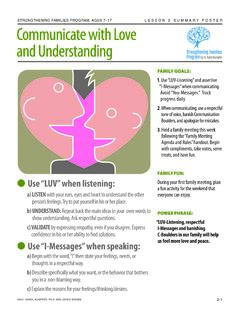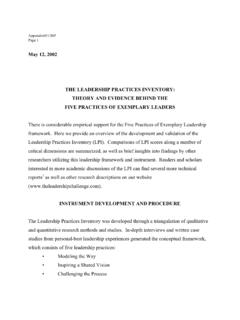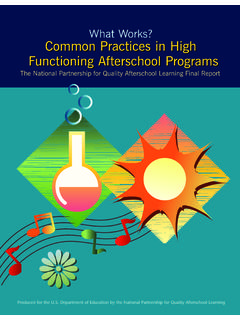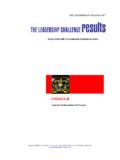Transcription of Effective Parenting Interventions (Kumpfer)(073007)
1 Advocating, Celebrating and Promoting Effective Parenting and Parenting Education 11331 Ventura Blvd, Suite 103 Studio City, CA 91604 3147 (818) 980-0903 (800) 325-2422 (818) 753-1054 Fax Effective Parenting Interventions for the Prevention of Child Maltreatment By Karol L. Kumpfer, , University of Utah Child maltreatment and ineffective Parenting is at unacceptably high levels nationally ( million children) with high costs to soci-ety. Child maltreatment is associated with a host of deleterious consequences for children, including physical injury; delayed growth; psychological problems such as aggression and depression; future substance abuse; perpetration of violence; and child death (National Research Council, 1993).
2 These alarming statistics highlight the need to prevent child mal-treatment by increased dissemination of Effective Parenting pro-grams. The National Clearinghouse on Child Abuse and Neglect (NCCAN, 2003) report over 80% of surveyed states found among child protective service caseloads that parental substance abuse and poverty are the two major factors associated with child maltreat-ment. Children of substance abusing parents are three times more likely to be abused and four times more likely to be neglected than children whose parents do not abuse alcohol and other drugs (Kumpfer & Bayes, 1995). National studies suggest that between 40% and 80% of all child maltreatment cases involve parental mis-use of alcohol or drugs (CWLA, 2003).
3 Supporting families are key to raising healthy, happy, productive children and preventing later adolescent problems. Developmental theories support the critical role of families in child raising. Our commercially oriented, fast-paced society appears to have forgot-ten this important role for parents. For about 20 years, parents have been bombarded by messages that they do not matter and that peers are a stronger influence on chil-dren s behaviors. Longitudinal research suggests that parents have a larger impact on their teens than previously thought (Resnick, et al., 1997). Although peer influence is the major reason adolescents initiate negative behaviors, a positive family environment ( , family bonding, parental supervision, and communication of pro-social family values) is the major reason youth do not engage in unhealthy behaviors, such as substance abuse, delinquency, and early or unprotected sex.
4 These protective family factors have even a stronger influence on girls (Kumpfer, Alvarado, & White-side, 2003). Continued on page The National Effective Parenting Initiative Continued on page What can be done to reduce the unacceptably high levels of harmful behaviors we see in adolescents to-day? Family psychologists have developed through practice and research some solutions. A number of family Interventions have been found through national expert reviews to be Effective in strengthening family systems and reducing childhood and adolescent problems. One review co-chaired by the author and Dr. Jose Szapocznik determined that four family-based approaches demonstrated the highest level of evidence of effectiveness in reducing behavioral and emotional problems in children five years and up.
5 These evidence-based family intervention approaches include: (1) behavioral parent training (primarily cognitive/behavioral parent training); (2) family skills training including parent training, children s skills training, and family practice time to-gether); (3) family therapy (structural, functional, or behavioral family therapy) and (4) in-home family support. These evidence-based approaches are described in more detail in the Kumpfer and Alvarado (2003) American Psychology article. For the past 16 years, the author and her colleagues have conducted periodic expert reviews to identify evidence-based family Interventions . The first review revealed 25 Parenting and family strengthening programs with some level of evidence of effectiveness.
6 The most recent review (Alvarado & Kumpfer, 2000) identified 35 family Interventions . Information on these specific family Interventions including program descriptions, web sites, and contact information can be found on the University of Utah s and OJJDP s Web site ( ). Seven family Interventions of these 35 programs met the highest level of evidence of effectiveness or Exemplary I, which required a minimum of two randomized control trials with positive results imple-mented by at least two independent research teams with different populations. These Exemplary I family programs include: Helping the Noncompliant Child, The Incredible Years, the Strengthening Families Program, Functional Family Therapy, Multisystemic Family Therapy, Preparing for the Drug Free Years, and Treatment Foster Care.
7 Seven programs were classified into the Exemplary II level because they had at least one randomized control trial with positive prevention results. The other programs were classified primarily into the Model Level, because they had employed only quasi-experimental research designs. Some Promising Level programs were added to the list because they were programs that were based of existing proven programs, but didn t have their outcome results yet. Since the last expert re-view in 1999, additional randomized control trials have been conducted on existing and new family in-terventions; hence the listing of evidence-based Parenting and family programs is currently being up-dated.
8 Core Content of Effective Family Programs All of the most Effective family programs involve the whole family (rather than just the parents or chil-dren) in interactive, skills or behavior change processes, rather than involving them in didactic educa-tional lessons. The underlying psychological theories are behavioral psychology and/or family systems theory (Liddle, Santisteban, Levant, & Bray, 2002). They stress the importance of the engagement proc-ess and reducing barriers to attendance often through relationship building services, personal invitations, providing meals, childcare and transportation, and sometime paying families for their time. Most begin with sessions designed to improve positive feelings in the family through positive reframing or skills ex-ercises stressing family strengths.
9 Practice in structured methods for communication and discipline tech- Effective Parenting Interventions (continued from page 1) Dissemination of Evidence-based Family Interventions Unfortunately, few family practitioners are trained to implement these model programs and currently, only about 10% of family Interventions are evidence-based practices. Our academic training programs should put more emphasis on training psychologists, social workers, counselors and parent educators in these Effective family intervention models. Most evidence-based family Interventions are highly structured programs with rigorous training programs to assure adherence or fidelity to the model and competence or quality of delivery.
10 The program developers, often university researchers, have had to devote time in recent years to developing Effective training systems with quality assurance methods for practitioners outside of their university. Most family intervention models require initial training workshops with some type of quality assur-ance system through ongoing process and outcome evaluations including standardized measures. The process evaluations include measures of the fidelity of the intervention and quality of delivery, atten-dance and participation of the families, client satisfaction, client s rating of the therapist on a number of qualities such as competence, empathy, and warmth. For group intervention models, site visits are conducted or the sessions are video taped.





